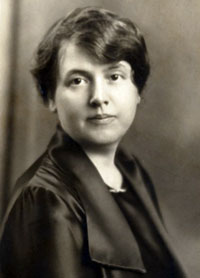Minnie Fisher Cunningham | |
|---|---|
 | |
| Born | March 19, 1882 |
| Died | December 9, 1964 (aged 82) New Waverly, Texas, US |
| Known for | Suffragist Politician First Exec Secretary League of Women Voters |
| Spouse | B. J. Cunningham |
Minnie Fisher Cunningham (March 19, 1882 – December 9, 1964) was an American suffrage politician, who was the first executive secretary of the League of Women Voters, and worked for the passage of the Nineteenth Amendment to the United States Constitution giving women the vote. A political worker with liberal views, she became one of the founding members of the Woman's National Democratic Club. In her position overseeing the club's finances, she assisted in the organization's purchase of its Washington, D.C. headquarters, which is still in use.
Cunningham was descended from wealthy plantation slaveholders who had moved to Texas from Alabama. By the time she was born in 1882, the family fortunes had been dissipated by the Civil War and Reconstruction, forcing her mother to sell vegetables to make ends meet. She holds the distinction of being the first female student of the University of Texas Medical Branch in Galveston to earn a Graduate of Pharmacy degree.
As a member of the National American Women's Suffrage Association, Cunningham helped persuade Senator Andrieus Aristieus Jones of New Mexico, chair of the Senate Woman Suffrage Committee, to introduce the amendment for a vote. Cunningham was part of a team who met with President Woodrow Wilson in the Oval Office, successfully coaxing the President into releasing a statement expressing a leaning towards suffrage.[1] When Texas Governor James E. Ferguson actively opposed the passage of the Nineteenth Amendment, Cunningham formed a coalition that helped impeach the governor.
She was active for decades in both national and Texas state politics. In 1928, Cunningham became the first woman from Texas to run for the United States Senate. She supported the New Deal policies and programs of Franklin D. Roosevelt, and sought to uplift the status of the disenfranchised in the country. Cunningham saw the connection between poverty and nutrition, and worked for government legislation to require nutrient enrichment of flour and bread. Cunningham's 1944 Texas gubernatorial candidacy against incumbent Coke Stevenson garnered her second place in a field of nine candidates. To meet the expenses of running a county campaign office for John F. Kennedy's presidential race, she sold used clothing.